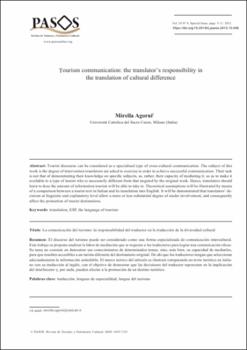Tourism communication: the translator's responsibility in the translation of cultural difference
Author
Agorni, MirellaDate
2012Abstract
El discurso del turismo puede ser considerado como una forma especializada de comunicación intercultural. Este trabajo se propone analizar la labor de mediación que se requiere a los traductores para lograr una comunicación efi caz.
Su tarea no consiste en demostrar sus conocimientos de determinados temas, sino, más bien, su capacidad de mediarlos, para que resulten accesibles a un turista diferente del destinatario original. De ahí que los traductores tengan que seleccionar adecuadamente la información asimilable. El marco teórico del artículo se ilustrará comparando un texto turístico en italiano con su traducción al inglés, con el objetivo de demostrar que las decisiones del traductor repercuten en la implicación del interlocutor y, por ende, pueden afectar a la promoción de un destino turístico. Tourist discourse can be considered as a specialised type of cross-cultural communication. The subject of this
work is the degree of intervention translators are asked to exercise in order to achieve successful communication. Their task
is not that of demonstrating their knowledge on specifi c subjects, as, rather, their capacity of mediating it, so as to make it
available to a type of tourist who is necessarily different from that targeted by the original work. Hence, translators should
learn to dose the amount of information tourists will be able to take in. Theoretical assumptions will be illustrated by means
of a comparison between a tourist text in Italian and its translation into English. It will be demonstrated that translators’ decisions at linguistic and explanatory level allow a more or less substantial degree of reader involvement, and consequently
affect the promotion of tourist destinations.





